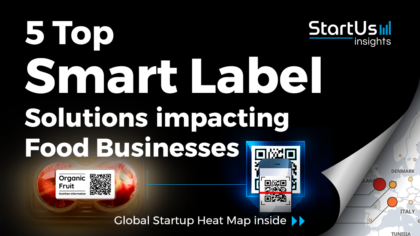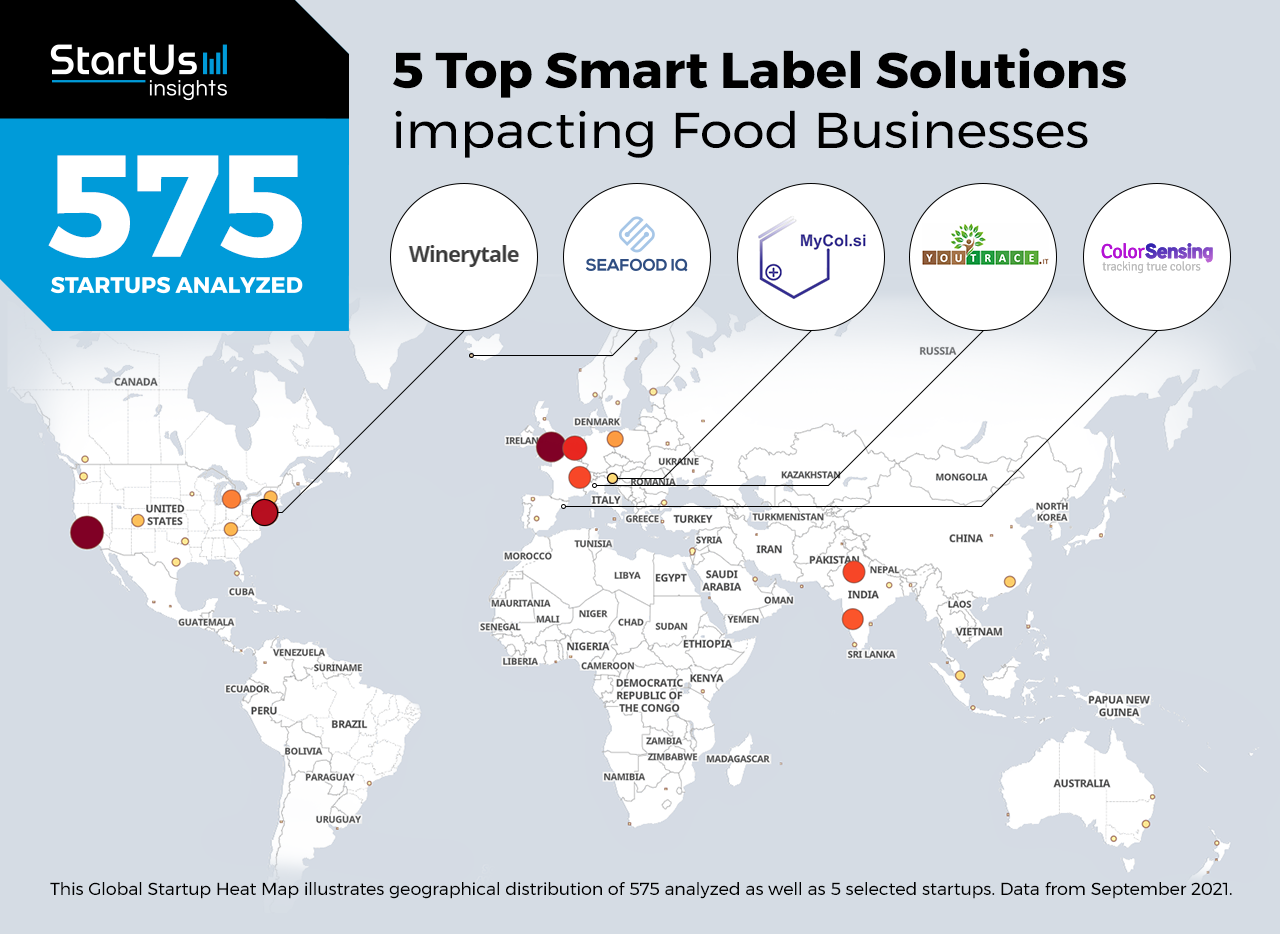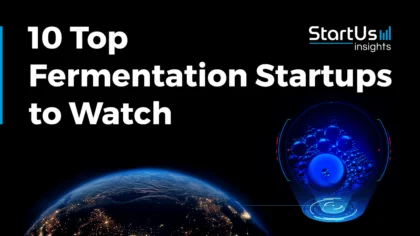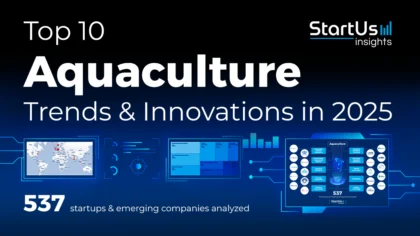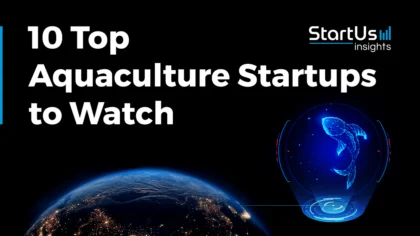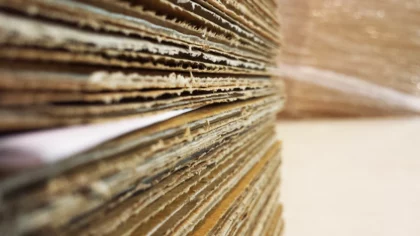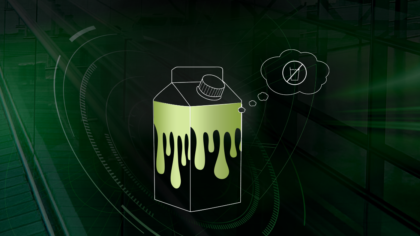Accelerate Productivity in 2025
Reignite Growth Despite the Global Slowdown
Staying ahead of the technology curve means strengthening your competitive advantage. That is why we give you data-driven innovation insights into the food industry. This time, you get to discover 5 hand-picked startups developing smart label solutions for food businesses.
Global Startup Heat Map highlights 5 Top Smart Label Solutions out of 575
The insights of this data-driven analysis are derived from the Big Data & Artificial Intelligence-powered StartUs Insights Discovery Platform, covering 2 093 000+ startups & scaleups globally. The platform gives you an exhaustive overview of emerging technologies & relevant startups within a specific field in just a few clicks.
The Global Startup Heat Map below reveals the distribution of the 575 exemplary startups & scaleups we analyzed for this research. Further, it highlights 5 smart label solutions that we hand-picked based on criteria such as founding year, location, funding raised, and more. You get to explore the solutions of these 5 startups & scaleups in this report. For insights on the other 570 smart label solutions for food businesses, get in touch.
YouTrace develops Anti-Counterfeit Labels
Customers are becoming increasingly conscious about information regarding the foods they consume. However, printed labels are easy to manipulate and therefore not always accurate. Hence, startups develop QR-based smart labels that guarantee the authenticity of food products. The QR-based serialization assigns a unique identity to each food item, allowing food companies to maintain their brand value and better engage with consumers.
Italian startup YouTrace develops QR-based smart labels to verify food product authenticity. The digital label uniquely associates with the product and allows the manufacturer to enter much more information than a simple printed label. The consumer scans the QR code to view authenticity details, supply chain information, raw materials used, as well as know the manufacturer and the entire manufacturing process, anytime on their device. YouTrace also allows consumers to enter identification numbers printed on the package and digitally obtain the related information.
Seafood IQ offers Printable Sensors
Perishable food products require techniques to validate authenticity and freshness. Counterfeit products not only cause financial loss to companies but also impact consumer health. Advanced packaging provides product and internal content information to ensure food safety. Some startups develop smart labels with radio frequency identification (RFID) technologies that provide protection against tampering and duplicates, whereas others provide temperature-based sensors in labels to detect product health.
Iceland-based startup Seafood IQ creates temperature-sensitive food labels. The startup develops printable thin-film food temperature sensors that provide freshness scores and shelf life estimations. The sensors also enable cold chain data analytics and benchmarking for seafood as well as have a printable battery and memory with almost a year’s lifetime. The startup’s RFID-based smart labels assign a unique identity to each item and prevent tampering, allowing food brands to prevent fraud and manage inventory in real-time.
Winerytale provides Augmented Reality (AR)-based Smart Labels
Most wine buyers research winemakers before buying products from them. Further, consumers look forward to learning about the story behind these brands. This allows brands to connect with their customers and strengthen brand loyalty. Apart from encryption and serialization, augmented reality-based packaging provides product information digitally. Hence, startups develop AR-based scanning technologies that allow wine lovers to discover the stories behind their favorite wines and interact with them personally.
French startup Winerytale develops AR-based smart labels and mobile applications for wine bottles. The solution allows wine companies to superimpose information over the bottle with one scan. Additionally, it lets consumers virtually interact with the information and share it on social media channels to avail offers. The encrypted labels get attached to the bottles during the production and provide an augmented experience to the consumers.
ColorSensing enables Color-Based Sensing
Tons of food waste is created every year because of labels indicating probable but not actual expiry dates. Consumers are unable to fully determine the food freshness status and end up throwing food away. Color sensing solves this issue by sensing color changes of food items and indicating the real-time food status based on this information. Startups develop technologies including serialization labels, printed sensor labels, and color sensing, among others, to display accurate food status on package labels.
Spanish startup ColorSensing makes smart labels using color-sensitive serialization technology for detecting the food health status. The startup develops smart QR labels with intelligent inks that detect color changes in food items. Further, scanning the code using the startup’s device reveals the actual food freshness level. The labels are attached to the food packaging during production and benefit food brands to reduce food wastage as well as assist retailers in inventory management.
MyCol builds Temperature-Sensitive Smart Labels
Many food products require specific temperatures during storage and transport. But food companies have few ways to record the temperature of packaged food. Consequently, consumers intake food items that may be unhealthy but do not show symptoms of spoilage. On the other hand, they often trash fresh food with misleading expiry details. Hence, companies and vendors implement temperature-based sensors to recognize food freshness levels and avoid wastage.
Slovenia-based startup MyCol develops temperature-sensing labels for food packaging. It uses thermochromic materials to create labels that record changes in temperature as a proxy for food freshness. The smart label provides a visual indication of the temperature change, which prevents food wastage, improves food quality and safety, as well as strengthens the cold chain.
Discover more Food Tech Startups
Food startups such as the examples highlighted in this report focus on anti-counterfeit labels, printable sensors, AR-based and temperature-sensitive smart labels as well as color-based sensing. While all of these technologies play a major role in advancing the food industry, they only represent the tip of the iceberg. To explore more food technologies, simply get in touch to let us look into your areas of interest. For a more general overview, you can download our free FoodTech Innovation Report to save your time and improve strategic decision-making.
